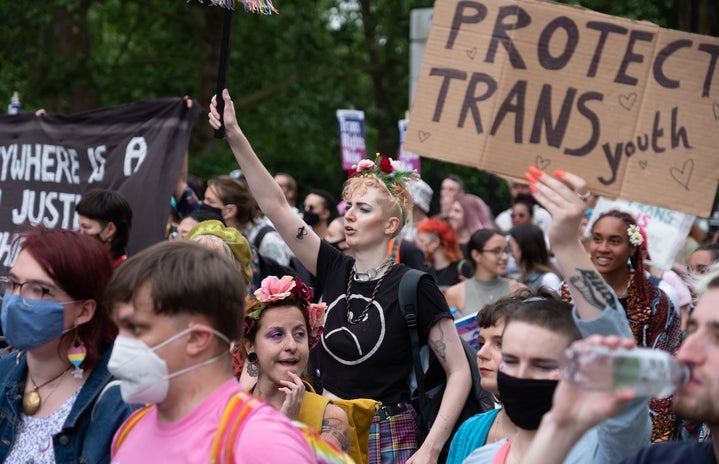International Transgender Day of Visibility on March 31, 2023 has come and gone, but hate against transgender people remains highly visible in new bills being proposed around the country.
According to the Trans Legislation Tracker, 496 anti-trans bills have been proposed nationally in 2023 alone. No, that’s not a typo. In the few months of 2023, 47 states and the federal government have proposed almost 500 anti-trans bills, 43 of which have been passed into law and 361 that are still active bills. Though reliable scientific sources show strong support for gender-affirming healthcare, we are living in a country where elected officials and prominent influencers are not so subtly trying to eradicate transgender people.
To put this amount of bills into perspective, a total of 19 bills were proposed in 2019, 66 in 2020, 144 in 2021 and 174 in 2022. In barely over three months, the U.S. has proposed more anti-trans bills than the last four years put together. When even just one bill can harm transgender people, these numbers are unprecedented and unbelievable.
The Trans Legislation Tracker has worked with organizations such as the American Civil Liberties Union (ACLU), the Human Rights Campaign, Freedom for All Americans and Gay & Lesbian Alliance Against Defamation (GLAAD). These groups determine what bills are considered “anti-trans” and track them. Interestingly, the types of bills being proposed have also changed. Bills are classified by the tracker into three categories, “bathroom/locker room/sports,” “health” and “other.” The “other” category currently contains half of all anti-trans bills proposed in 2023. In 2019, this category only made up 15% of the bills proposed. So, what happened?
Though banning trans people in sports and bills limiting gender-affirming care are being introduced, more proposals are seen that limit LGBT+ inclusive education in schools. These include laws passed in Florida in 2022 like the “Don’t Say Gay or Trans” law and the “Stop WOKE Act,” which censored conversations in the workplace about systemic racism and gender discrimination.
Emily St. James from Vox writes, “The goal isn’t just to punish trans kids seemingly for existing but to limit the imaginations of everybody else. If schools aren’t allowed to use language that suggests trans people exist and if trans kids aren’t allowed to pursue treatment, then the hope of these lawmakers seems to be that by never allowing discussion of these ideas, boundaries are placed upon the imagination.”
Needless to say, there are more bills than this article has time to deconstruct, but these Florida bills set a precedent for the rest of the country. Here is a short–but not comprehensive–list of the common anti-trans issues bills proposed in 2023 are targeting:
transgender people in the military, puberty blockers and hormone replacement therapy for trans minors, gender-affirming surgery for minors, gender-affirming care for adults up to 26 years old, “parental rights” in children’s education around transness, trans book bans in schools, “drag bans” concerning people who perform while wearing clothing “differing from their sex assigned at birth” and exclusionary definitions of “man” and “woman.”
According to the ACLU, Missouri currently has the second most anti-trans bills in the country with 48. Texas is barely ahead with 51. To break down the Missouri bills, 17 target schools and education, nine target healthcare, four target free speech and expression, three target civil rights and the remaining 17 target other miscellaneous issues. Most recently, the Missouri House of Representatives passed a bill banning gender-affirming care for minors under the reasoning that it would protect children. That same day, MO Senator Mike Moon, a huge supporter of the bill, voiced his support for child marriage as young as 12, bringing to question if the senator’s intentions are really to “protect” minors.
On April 13 of this year, Missouri Attorney General Andrew Bailey announced an emergency regulation that drastically changes how transgender people in Missouri of any age get gender-affirming care. In order for a person to receive any form of gender-affirming care, they must show documented signs of dysphoria for at least three years and complete 15 therapy sessions over 18 months. Even after these requirements are complete, patients must be screened for autism, “social media addition” and must overcome any mental health symptoms before receiving care. This regulation has been put in place despite clear scientific evidence that shows gender-affirming care helps negative mental health symptoms. Missouri is the first to pass legislation of this kind, but more states may follow suit now that it’s out there.
If the sheer numbers don’t convince you that the United States is experiencing an epidemic of attacks on trans people, let me summarize some of the political commentary on the bills. Ezra Klein and Gillian Branstetter of the New York Times broke down the intentions behind the political attacks. They write, “the right is now making trans people their political target. And the most ambitious conservatives are competing not just in rhetoric, but in policy, to make their lives harder, to try to push them out of the boundaries of public life.”
“There can be no middle way in dealing with transgenderism. It is all or nothing.” said right-wing podcaster Micheal Knowles. “Transgenderism must be eradicated from public life entirely.” Knowles also used the murder of three children and three adults in the recent Nashville school shooting to villainize the entire trans community because the shooter identified as transgender. Knowles is not the only influencer using their social capital to demonstrate support for the anti-trans movement. After Bud Light sent transgender influencer Dylan Mulvaney some beers to promote on TikTok, Kid Rock posted a video of himself shooting cans of Bud Light with an assault rifle and country singer Travis Tritt banned the beer on his tour.
Being transgender in this political climate can be dehumanizing, exhausting, and downright terrifying. But transness does not discriminate between race, color, religion, socio-economic status, sexual orientation, or national origin. Transness and trans people are everywhere, in every culture and every part of the world, and we are not going away. If anti-trans speakers like Micheal Knowles have the freedom of speech to claim we should be “eradicated,” then we have the freedom of speech to make trans love, joy and support just as visible as any hate that may befall us. This goes for cisgender allies as well. Voice to your representatives your support for the trans community. Ask them not to support anti-trans bills. Most of all, don’t be afraid to be loud, our lives may depend on it.


